Best VPN For Linux 2025: Premium & Free VPNs for Penguin
Not every VPN provider offers a Linux app, and even fewer will give you one with a graphical user interface. Choosing one that is simple enough to set up and use is easier said than done, which is why we reviewed the best Linux VPN services.
Linux is the go-to OS for many developers and IT enthusiasts. The problem is that with such a small market share, not a lot of VPN service providers focus on the Linux experience. If you’re a Linux user and would like to double your online security, in this article, we’ve compiled and reviewed the best VPN for Linux.
If you’re not keen on reading through, Surfshark took the win as it’s the top VPN with a graphical user interface (GUI) for Linux and low-cost subscription options. If you want something a little faster and don’t mind using the command line interface, NordVPN is a great choice.
There are some interesting alternatives that might be a better fit for your needs, so read on.
-
12/03/2021 Facts checked
Cloudwards revamped the list by expanding the number of services and adding providers compatible with Linux.
-
10/01/2024 Facts checked
We updated these rankings to reflect current VPN performance, features and pricing.
-
11/28/2024 Facts checked
Rearranged our VPN rankings to better reflect VPN services performance on Linux.
Top VPNs for Linux
- 1
- : PayPal, Credit card, Google Pay, Amazon Pay
- : Unlimited
- :
- :
- :
- :
Average speedDownload Speed90 MbpsUpload Speed9 MbpsLatency3 ms - 2
- : PayPal, Credit card, Google Pay, JCB, UnionPay, Bitcoin, Ethereum, X-Coin
- : 10
- :
- :
- :
- :
Average speedDownload Speed90 MbpsUpload Speed9 MbpsLatency3 ms - 3
- : PayPal, Credit card, Amazon, Paygarden, Apple Pay, Google Pay
- : Unlimited
- :
- :
- :
- :
Average speedDownload Speed80 MbpsUpload Speed9 MbpsLatency62 ms - 4
- : PayPal, Credit card, Bitcoin, UnionPay, iDeal, Sofort, Giropay, Pixpay, Sepa Direct Debit
- : 8
- :
- :
- :
- :
Average speedDownload Speed91 MbpsUpload Speed9 MbpsLatency3 ms - 5
- : PayPal, Credit card
- : 10
- :
- :
- :
- :
What Makes the Best Linux VPN
If you look at our list of best VPNs, you will find that four things matter most: speed, security, features and price. You want a fast VPN that won’t impact your browsing speeds too much, and you want your VPN connection to be for your eyes only. Additional features like a strict no-logs policy, kill switch and split tunneling are also welcome, and budget is always a consideration. These VPN services check all the aforementioned boxes.
With Linux users, however, there are a few other factors. OS support is first, with Linux being split up between Debian-based and Red Hat Linux-based distros, and you want the VPN service to support the distro you’re using. If possible, you also want the VPN client to offer the exact same features and functionalities it offers on other operating systems.
While some Linux users are well versed in using a command-line interface (CLI), a dedicated Linux client with a graphical user interface (GUI) is a huge bonus because it makes using and configuring the VPN service much easier. While we’re talking about bonuses, any additional features that are Linux-specific also count.
The 5 Best VPNs for Linux
Whether you’re looking for a Linux app with a neat GUI or you prefer to use the terminal, here are the best VPNs for Linux.
1. Surfshark — Best Linux VPN With GUI
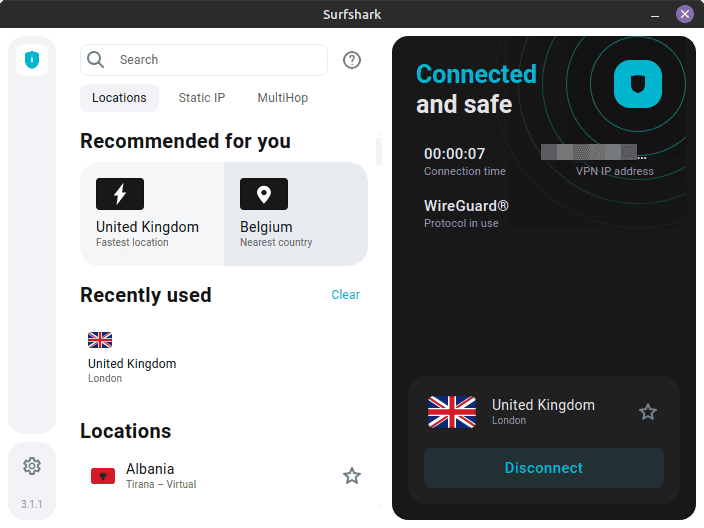

Very Fast

Very Fast

Very Fast
Surfshark’s Linux GUI makes it simple to connect to a server, and it’s available on Ubuntu 20.04 LTS and up, Debian 11 and up and Mint 20 and up. Linux users who run multiple devices at the same time will love Surfshark and its unlimited simultaneous connections. We gave it a lot of praise in our Surfshark review.
With the updated GUI, Linux users can now benefit from the speedy WireGuard protocol as well as OpenVPN. Plus, you’ll have features like leak protection, auto-connect and a kill switch to protect your online activity.

Pricing is affordable, with a two-year plan getting you a reasonably good value. Plus, you have a 30-day money-back guarantee if you find Surfshark doesn’t perform the way you expect it to.
- Unlimited GB bandwidth, Unlimited devices, Secure VPN, Ad blocker, Cookie pop-up blocker. Pricing for the annual and biennial plans only apply for the first payment. Renewal fees vary.
- Unlimited GB
- Unlimited
- Yes
- Everything in Starter, plus Antivirus protection, Identity protection, Email Breach and Credit Card Alerts, Online Alias Pricing for the annual and biennial plans only apply for the first payment. Renewal fees vary.
- Unlimited GB
- Unlimited
- Everything in One, plus Data removal Pricing for the annual and biennial plans only apply for the first payment. Renewal fees vary.
- Unlimited GB
- Unlimited
2. NordVPN — Strong Security for Linux With CLI
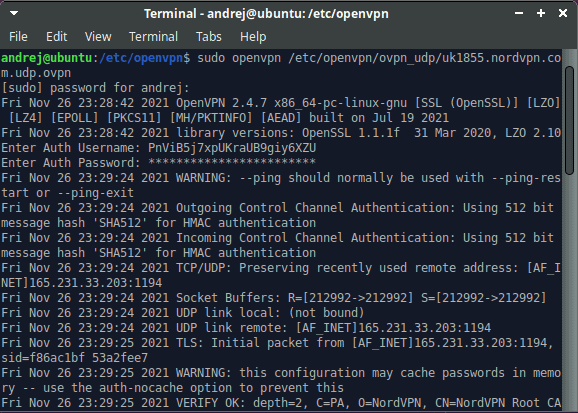

Very Fast

Very Fast

Very Fast
NordVPN is a great choice for Linux because of its speed and security. The NordLynx protocol is NordVPN’s implementation of WireGuard, which adds an extra layer of protection on top of the speedy base protocol. The app is also compatible with Debian and Red Hat distros, and you can find guides on how to set it up with openSUSE.
Unfortunately, not only is it command line–based, but it’s also a tedious chore to connect to any of its VPN servers. You’ll need to pick between UDP and TCP, choose the server and then write the exact command to connect to said server with the specified parameters.
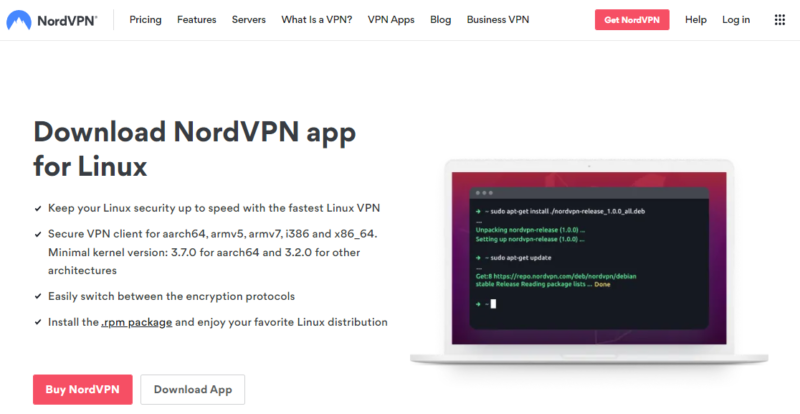
As far as pricing goes, NordVPN offers the best value for money if you opt for a two-year plan. If you do, and decide you don’t want to type out long commands every time you need a VPN, there is a 30-day period in which you can get a refund. You can find out more about it in our NordVPN review.
- **VAT may apply
- Unlimited GB
- 10
- Yes
- *The prices are charged in the first billing cycle only. Renewal prices vary.
- Unlimited GB
- 10
- Yes
- *The prices are shown only apply for the first 12 months.
- Unlimited GB
- 10
- Yes
- **The prices are applicable only for the first 24 months. Secure, high-speed VPN Threat Protection Pro™: Anti-malware and advanced browsing protection Threat Protection Pro™: Ad and tracker blocker Password manager with Data Breach Scanner 1 TB of encrypted cloud storage Identity and SSN monitoring and alerts Credit monitoring services Up to $1M in identity theft insurance Up to $100K in cyber extortion insurance
- 10
3. Private Internet Access — Feature-Rich VPN for Linux With GUI
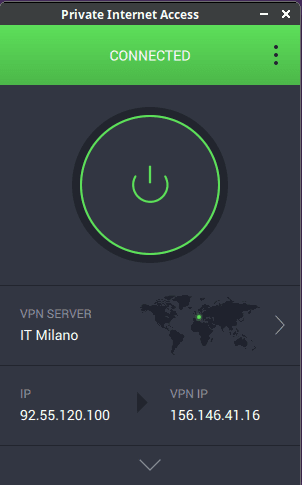

Very Fast

Very Fast

Fast
Private Internet Access is a great Linux VPN, thanks to the ease of installation and use and its well-thought-out graphical UI. Feature-wise, it is identical to the app made for other operating systems. It’s highly customizable and has a built-in ad and malware blocker that works fairly well, as you can see in our PIA review.
You can install PIA on both Debian and Red Hat–based distros, which makes it one of the best VPNs for Linux in terms of versatility. The limit of 10 simultaneous connections is generous enough, and we like that you can add an antivirus and a dedicated IP address to your subscription (at an additional charge, of course).
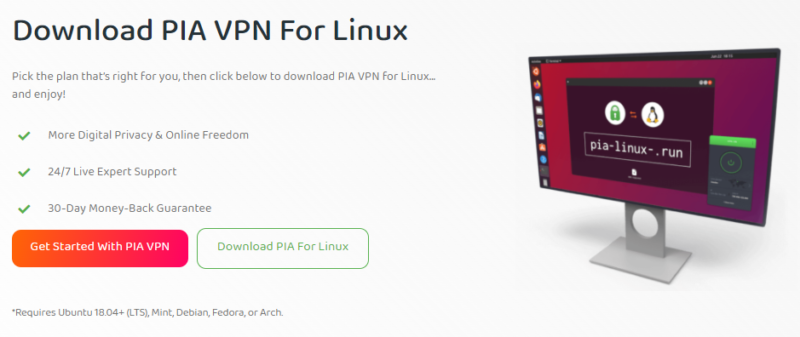
PIA’s monthly plan isn’t exactly cheap, but if you subscribe for three years, you get much better pricing. With a 30-day money-back guarantee, it’s among the best VPNs for Linux users.
4. ExpressVPN — Fast Linux VPN
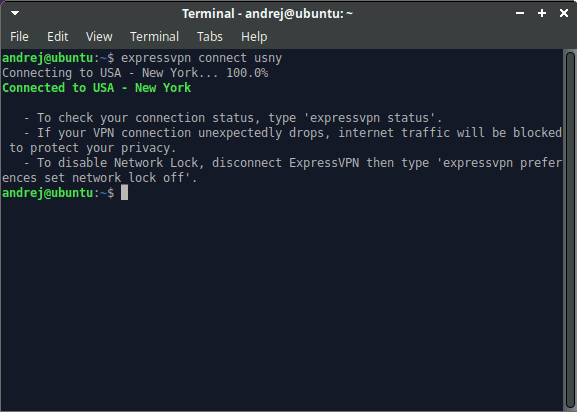

Very Fast

Very Fast

Very Fast
Linux’s users sometimes prefer speed to everything else. If that’s the case with you and your quest for a good VPN service, ExpressVPN is one of the fastest VPNs out there (learn more in our ExpressVPN review). Despite that, the lack of a graphical interface is enough to push it lower down on our list because it might be a bit difficult to set up and use.
To connect to a server, you only need to look at the list of locations and type in the appropriate server abbreviation, but it’s still more complicated than a few mouse clicks. However, if this is something you’d be willing to work with, you can use ExpressVPN on almost any distro.

ExpressVPN’s Achilles’ heel is that it’s expensive, even with a long-term subscription. That aside, ExpressVPN is a great VPN adept at streaming, torrenting and gaming — it’s one of our best Steam and League of Legends VPNs. If you’d still like to try it out, though, you get a 30-day money-back guarantee.
5. Proton VPN — Best Free VPN for Linux
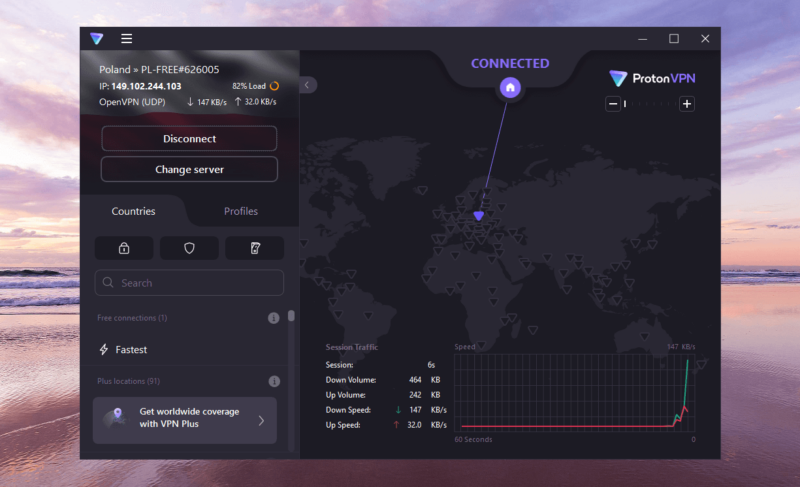
Proton VPN’s free plan has received a lot of praise from users of VPN services, and we had some nice things to say in our Proton VPN review, too. The fact that it gets you a graphical interface for Linux is reason enough to have it on your radar. The app is organized very well, and if you’re on the free plan you’ll have the five VPN server locations available right at the top.
The fact that you don’t have a data limit, even on the free plan, is excellent. Its what makes it a great free VPN Linux. However, Proton VPN does admit to throttling your speed if you don’t pay for a premium plan. The Linux app works with both Debian and Red Hat–based distros, and there’s even a guide to configure an OpenVPN connection on unsupported distributions.
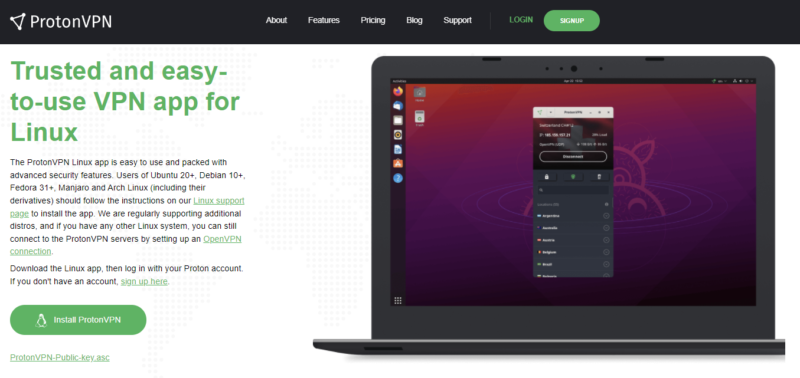
If you don’t mind slightly slower speeds and not being able to choose your server location, the free plan makes Proton VPN the best free VPN for Linux, period. If you still want to try out one of the premium plans, though, you have a 30-day window to change your mind and get a refund.
- Unlimited GB
- 1
- Yes
- 500 GB storage 1 user 15 extra email addresses for you Support for 3 custom email domains Unlimited folders and labels Unlimited hide-my-email aliases Dedicated customer support Ultra fast and private VPN Encrypted password manager Encrypted cloud storage for photos and documents Advanced account protection
- Unlimited GB
- 10
- Yes
- **Renewal prices differ for the 1-year and the 2-year plans. Price includes all premium Proton services (Proton Mail, Calendar, Drive, VPN, Pass, & Wallet)
- Unlimited GB
- 10
What Is the Best Free Linux VPN?
When it comes to using a free VPN service, most of them aren’t worth touching with a 10-foot pole. They might try to sell your data or bundle malware with the installation file. Some of them will do very little when it comes to protecting your connection, allowing your internet service provider to see exactly which websites you’re visiting.
However, there are some exceptions to this rule, like Proton VPN and Windscribe. When it comes to a user-friendly VPN for Linux, Proton has the edge, thanks to the GUI-based VPN app that’s simple to use. On the other hand, WIndscribe offers 10 VPN server locations, but requires that you know your way around a Linux terminal.
Does Linux Distro Matter for VPN Service Use?
To an extent, yes, but it has more to do with whether or not your distro is based on Debian or Red Hat, and less with the actual distro itself. Functionally, the main difference is the software management system, with Debian using .deb files, whereas Red Hat uses .rpm. This means you’ll need to be careful when selecting the installation files to download.
Both types are, at their core, Linux distros. Chances are that if a VPN has a native Linux client with support for Debian-based distros, it will also have one that supports Red Hat.
VPNs Linux Users Should Avoid
Not every VPN service provider has Linux support, and two popular VPN providers that don’t have it are TunnelBear and VyprVPN. Looking at both providers’ support pages, they do mention that you can try to configure them to work with Linux, but they didn’t work on our Ubuntu 20.04-based system.
Final Thoughts
Users who don’t need Linux apps and would rather use the terminal can choose NordVPN. It has robust security features and fast connection speeds, but if you’re not familiar with the CLI you might be in for a difficult experience.
Linux users who want a secure VPN with a simple GUI and rich feature set will find their answer in the winner, Surfshark. Its strict no-logs policy protects security-conscious Linux user data, and the price is reasonable compared to most of the competition. Plus, it has a 30-day money-back guarantee if you change your mind.
Do you use a Debian-based distro like Linux Mint, or is Red Hat more your cup of tea? Which do you prefer, Surfshark’s graphical user interface, or NordVPN’s CLI-based apps? Let us know in the comments, and as always, thank you for reading.
FAQ: The Best Paid and Free VPNs for Linux
No, Linux does not have a built-in VPN. To use a VPN on Linux, you’ll need to install and set up your own VPN.
No, Ubuntu doesn’t have a built-in VPN, but you can install and configure your own Ubuntu VPN.
If you want your internet connection to remain for your eyes only, and you want to add security to your internet browsing experience, you need a VPN with any operating system, including Linux.
You can set up VPNs for Linux by using the VPN provider’s setup guide. Some have an installation file, while others will require you to use the command-line terminal to set them up. It varies depending on the Linux VPN provider.

